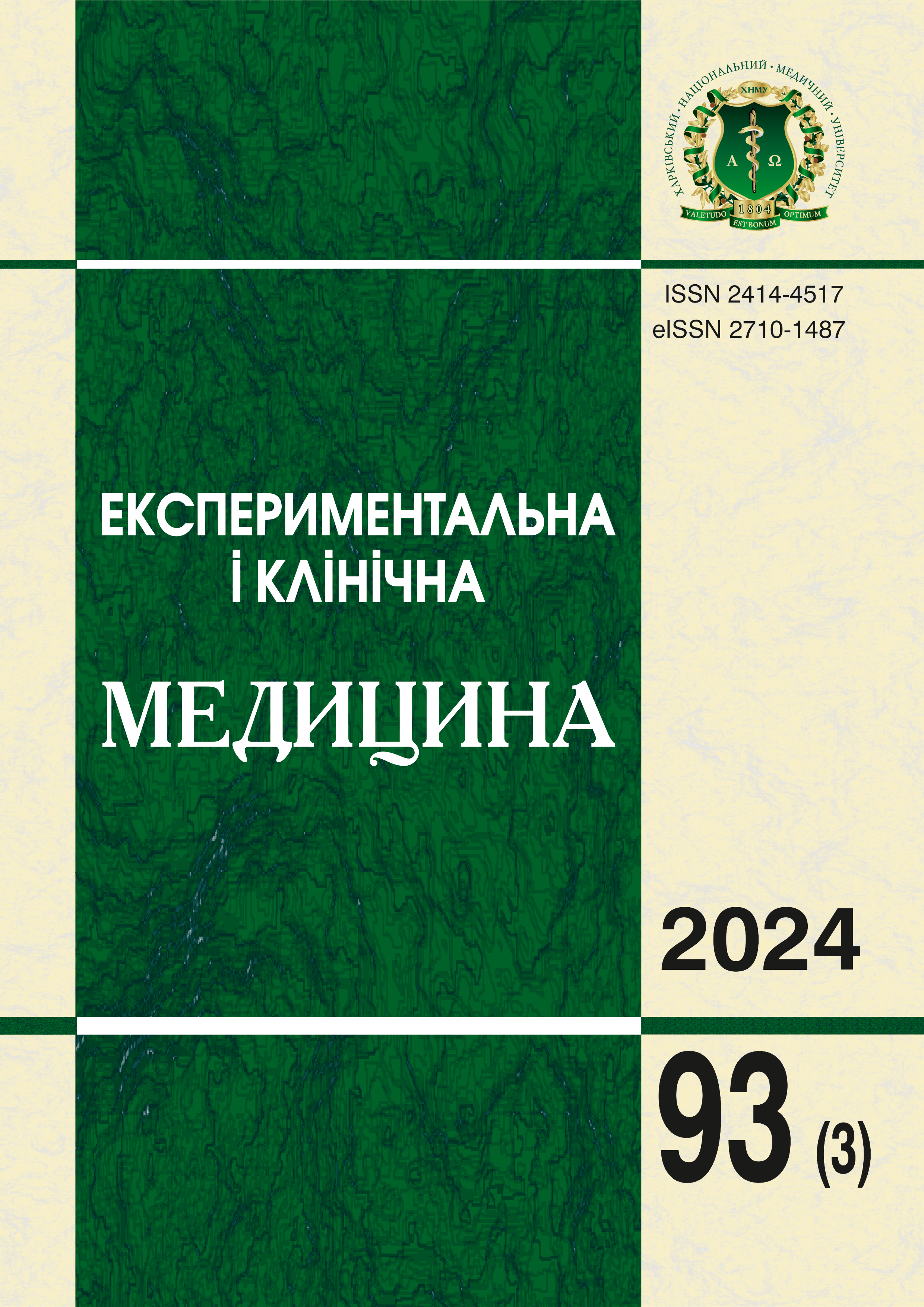Abstract
Insulin Resistance (IR) is a state of insufficient biological response of the body's cells to insulin, which leads to further disruption of carbohydrate metabolism and increased blood glucose levels. Early detection of IR risk factors improves the prognosis and prevention of severe metabolic syndrome, preservation and restoration of women's reproductive potential, and becomes the foundation for the health of the future generation. Aim of the study was the influence of potential risk factors on the development of latent IR manifestations 82 women of early reproductive age who signed an informed consent for the study were examined. A specially designed questionnaire was used for the study, and anthropometric parameters and laboratory data (including insulin, glucose tolerance test), and calculation of indices (HOMA-IR (Homeostasis Model Assessment of Insulin Resistance) and Matsuda). According to the results of the study, in accordance with the indicators of Relative Risk (RR) and Odds Ratio (OR), we consider the following potential factors to be developmental bad habits (tobacco smoking regardless of the amount, regular alcohol abuse) (RR=1.299; p=0.00321), burdened hereditary history of cardiovascular diseases (essential hypertension, heart attacks and strokes) (RR=1.313; p=0.0041), type I and type II diabetes mellitus (RR=1.340; p=0.0038), obesity (RR=1.641; p=0.0043), thyroid diseases (hypothyroidism, hyperthyroidism, hyperparathyroidism) (RR=1.565; RR=1.565; p=0.00284) and adrenal (Itzen-Cushing's syndrome, adrenal cortex insufficiency) (RR=1.348; p=0.0025). The manifestations of IR should be skin rashes (OR=3.542; p=0.0033) and unwanted hair growth (OR=3.670; p=0.0029).
Keywords: overweight, obesity, metabolic syndrome, vaginal microbiome, ovulation, infertility.
References
Zeber-Lubecka N, Ciebiera M, Hennig EE. Polycystic Ovary Syndrome and Oxidative Stress-From Bench to Bedside. Int J Mol Sci. 2023;24(18):14126. DOI: 10.3390/ijms241814126. PMID: 37762427.
Gu Y, Zhou G, Zhou F, Li Y, Wu Q, He H, et al. Gut and Vaginal Microbiomes in PCOS: Implications for Women's Health. Front Endocrinol (Lausanne). 2022;13:808508. DOI: 10.3389/fendo.2022.808508.
Mukherjee A, Wanjari U, Kannampuzha S, Murali R, Namachivayam A, Ganesan R, et al. The Implication of Mechanistic Approaches and the Role of the Microbiome in Polycystic Ovary Syndrome (PCOS): A Review. Metabolites. 2023;13(1):129. DOI: 10.3390/metabo13010129. PMID: 36677054.
Matsuda M, DeFronzo RA. Insulin sensitivity indices obtained from oral glucose tolerance testing: comparison with the euglycemic insulin clamp. Diabetes Care. 1999;22(9):1462-70. DOI: 10.2337/diacare.22.9.1462. PMID: 10480510.
Matthews DR, Hosker JP, Rudenski AS, Naylor BA, Treacher DF, Turner RC. Homeostasis model assessment: insulin resistance and beta-cell function from fasting plasma glucose and insulin concentrations in man. Diabetologia. 1985;28(7):412-9. DOI: 10.1007/BF00280883. PMID: 3899825.
Motsnyi FV. Analysis of Nonparametric and Parametric Criteria for Statistical Hypotheses Testing. Chapter 1. Agreement Criteria of Pearson and Kolmogorov. Stat. Ukr. 2018;83(4):14-24. DOI: 10.31767/su.4(83)2018.04.02.
Jeong SH, Joo HJ, Kwon J, Park EC. Association Between Smoking Behavior and Insulin Resistance Using Triglyceride-Glucose Index Among South Korean Adults. J Clin Endocrinol Metab. 2021;106(11):e4531-41. DOI: 10.1210/clinem/dgab399. Erratum in: J Clin Endocrinol Metab. 2022;107(5):e2219. DOI: 10.1210/clinem/dgab886. PMID: 34160623.
Mukharjee S, Bank S, Maiti S. Chronic Tobacco Exposure by Smoking Develops Insulin Resistance. Endocr Metab Immune Disord Drug Targets. 2020;20(6):869-77. DOI: 10.2174/1871530320666200217123901. PMID: 32065107.
Liu X, Tang H, Luo Z. [Insulin Resistance and Skin Diseases]. Acta Academiae Medicinae Sinicae. 2020;42(2):247-50. DOI: 10.3881/j.issn.1000-503X.11609. PMID: 32385033. [In Chinese].
Rehman K, Haider K, Akash MSH. Cigarette smoking and nicotine exposure contributes for aberrant insulin signaling and cardiometabolic disorders. Eur J Pharmacol. 2021;909:174410. DOI: 10.1016/j.ejphar.2021.174410. PMID: 34375672.
Unluhizarci K, Karaca Z, Kelestimur F. Role of insulin and insulin resistance in androgen excess disorders. World J Diabetes. 2021;12(5):616-29. DOI: 10.4239/wjd.v12.i5.616. PMID: 33995849.
Jeje SO, Adenawoola M, Abosede C. Gestational Nutrition as a Predisposing Factor to Obesity Onset in Offspring: Role for Involvement of Epigenetic Mechanism. Niger J Physiol Sci. 2022;37(1):1-7. DOI: 10.54548/njps.v37i1.1. PMID: 35947841.
Nijs H, Benhalima K. Gestational Diabetes Mellitus and the Long-Term Risk for Glucose Intolerance and Overweight in the Offspring: A Narrative Review. J Clin Med. 2020;9(2):599. DOI: 10.3390/jcm9020599. PMID: 32098435.
Lecoutre S, Maqdasy S, Breton C. Maternal obesity as a risk factor for developing diabetes in offspring: An epigenetic point of view. World J Diabetes. 2021;12(4):366-82. DOI: 10.4239/wjd.v12.i4.366. PMID: 33889285.
Venditti P, Reed TT, Victor VM, Di Meo S. Insulin resistance and diabetes in hyperthyroidism: a possible role for oxygen and nitrogen reactive species. Free Radic Res. 2019;53(3):248-68. DOI: 10.1080/10715762.2019.1590567. PMID: 30843740.
Kosmas CE, Bousvarou MD, Kostara CE, Papakonstantinou EJ, Salamou E, Guzman E. Insulin resistance and cardiovascular disease. J Int Med Res. 2023;51(3):3000605231164548. DOI: 10.1177/03000605231164548. PMID: 36994866.
Helle E, Priest JR. Maternal Obesity and Diabetes Mellitus as Risk Factors for Congenital Heart Disease in the Offspring. J Am Heart Assoc. 2020;9(8):e011541. DOI: 10.1161/JAHA.119.011541. PMID: 32308111.
Angelidi A, Filippaios A, Mantzoros C. Severe insulin resistance syndromes. J Clin Invest. 2021;131(4):e142245. DOI: 10.1172/JCI142245. PMID: 33586681.
Tatarchuk T, Pedachenko N, Kosei N, Malysheva I, Snizhko T, Kozub T, et al. Distribution and anthropometric characteristics of Rotterdam criteria-based phenotypic forms of Polycystic ovaries syndrome in Ukraine. Eur J Obstet Gynecol Reprod Biol. 2024;295:104-10. DOI: 10.1016/j.ejogrb.2024.02.011. PMID: 38354601.

This work is licensed under a Creative Commons Attribution-NonCommercial-ShareAlike 4.0 International License.

